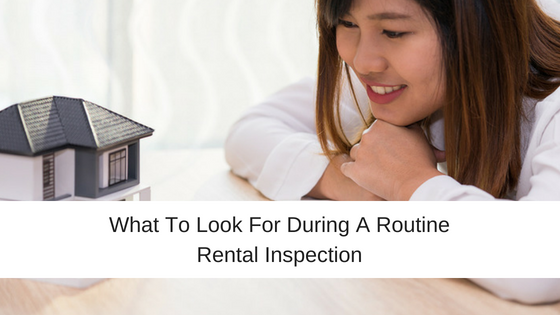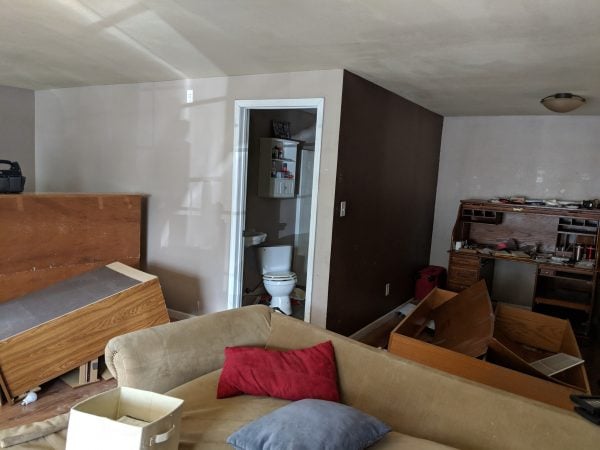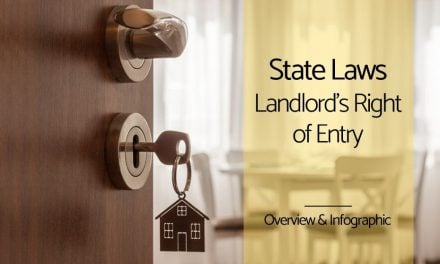
A routine inspection of your investment property is an excellent time to check out the condition of the rental, ensure appliances are up-to-date and serviced, check-in with your renters, and identify any potential problems or lease violations.
A landlord’s dream come true is a long-term, low maintenance tenant (who also pays rent on time). The longer the tenancy, the less work involved with a tenant moving out – i.e. administrative tasks like marketing the property, meeting applicants to show the property, screening tenants, preparing the property for the next tenant, and dealing with a zero-rental income vacancy month.
On the flip side of these dreamy long-term tenancies is the ease in which you can just let your tenants be and forget to check in on the property. If the rent keeps showing up each month and you have no maintenance phone calls, it’s easy to just assume everything is going perfectly at the property.
The Importance of Annual Rental Inspections
Here’s an example of some long-term tenants I had that resulted in a nightmare rental situation, in which an annual inspection might have prevented the resulting damage.
Let’s call these tenants Beth and Phil*. Beth and Phil moved into a 5 bedroom, 2 bathroom single family home in 2009. They passed the criminal and credit background check. They paid rent on time and called perhaps once a year with normal and easy maintenance requests. Things were going great for the past 9 years. Then one spring day in 2018, the property manager calls to say the cops have been at the house and there has been a situation.
Turns out Beth and Phil split up more than a year ago, Beth stayed and Phil moved away. The owner and the property manager were never informed that one of the tenants left the property. Recently, Phil returned to the property and demanded to move back in. Since he was still on the lease, he had every legal right to do so, even though Beth did not want him there. Beth decided to move out; again never telling the property manager.
Phil invites his adult son to live with him at the property, and you guessed it, never informs the property manager. Due to some medical issues, Phil and the adult son experience a couple episodes involving extreme paranoia.
The following is a list of some of the damage done to the rental property as a result of the paranoia: all light fixtures ripped off out of the ceiling, the ceiling fan ripped off the ceiling, one toilet pulled away from the wall, another toilet filled with Christmas tree lights, wires cut from the hot water heater, walls stabbed and slashed with a knife, walls spray painted, attic ductwork and insulation damaged and cut down, shower heads ripped from the wall, closet doors and cabinets ripped down, roof vents damaged and kicked in.
This is just some of the damage, which has been estimated at over $50,000 to repair.

Here’s a photo of the rental property after the renters abandoned it. Notice the toilet ripped away from the bathroom wall?
Annual Inspections Prevent Expensive Damage
While this is an extreme example of a renter situation gone bad, here is what an annual inspection might have revealed. The property manager would have had a chance to personally connect with Beth, giving her a chance to inform him that Phil was no longer living at the property. After Beth moved out, the property manager could have discovered the son, living at the property as a long-term guest. In the former case, a new lease would have been issued, naming Beth as the single occupant, which would have prevented Phil from legally moving back in before damaging the property. In the later case, by identifying a long-term guest, the property manager could have asked the adult son to go through the tenant screening process in order to get added to the lease. In either case, the property manager would have been informed of the state of the rental situation providing better protection to the property and the owner’s investment.
Annual Rental Inspections give the landlord or property manager a great chance to:
- Identify any maintenance issues that need to be fixed before they become expensive problems.
- Make sure your tenants are following lease terms and taking care of tenant required maintenance.
Additionally, these routine inspections provide further insight into the presence of a long-term guest or an unauthorized pet.
The purpose of annual inspection is to prevent problems down the road by communicating with your renters and discover fixable issues before they become expensive problems.
Annual Inspections and the Lease
It’s a good idea to build annual inspections into your lease agreement. An easy way to approach these inspections with your renters is to tell them you are going to check on the appliances to make sure they don’t need any servicing. By using this type of language, hopefully your tenants don’t feel like you are spying or being too invasive. While you are at the property, definitely check out the major appliances. But also do a quick walk through to identify any other problem areas, like under sinks for water damage.
Remember to always provide proper notice to your tenants before entering the property for a routine inspection, as required by your state’s laws.
Make sure to keep excellent records of your inspections, including notes with dates and pictures. Inspection reports and paperwork help you keep track of the condition of your property, and can also serve as as legal documents if anything happens to your rental home.
Related Reading For You:
- Important Inspections For Your Rental Property
- 5 Reasons Your Rental Property Is Still Vacant
- What To Do When A Tenant Wants To Break Their Lease
*Names have been changed.






Yearly inspections are not enough. A lot can happen in a year. We do quarterly inspections!
Yeah! Quarterly inspections for the win!
If my landlord did an inspection every 3-4 months “checking on appliances,” I wouldn’t stay longer than a year. It’s obvious to the tenet that you aren’t “checking on appliances” and can’t be up front about your reasons for entry. This sows distrust.
As a renter (and I might be in the minority), I feel the apt/home is my responsibility to keep working, clean, and up to date with repair requests. I pay on time and expect privacy. I understand the owner needs to check on their investment, but at 3-4 times a year, I’d feel harassed. I will just find another place to live and you will have lost a long term, diligent, and on time paying renter.
Inspections outside of the routine are typically reserved when there is cause for concern for the welfare of the occupants, neighbors, and/or property. Having worked in the industry, I found that most landlords are extremely caring and work hard at building trust; and most tenants are responsible, diligent, and pay on time like you.
However, sometimes a random (with proper notice) visit is needed when there is suspicion of activity the violates the lease and/or puts people or the property in danger such as criminal activity. Of course, those inspections likely wouldn’t impact a responsible renter such as yourself.
With that, you are correct that there is a line between concern and harassment, and again correct that if a landlord crosses that line they may lose a great tenant. I always recommend both landlords and tenants find out their local and state regulations on a landlord’s right of entry and tenants’ rights to privacy and quiet enjoyment.
Annual inspection is not enough for rent house. To avoid more damage it need twice a year.
Thanks for your feedback, Philip. Some landlords inspect even up to three times a year as well as conduct drive by inspections. Just remember to always give proper notice if you are going to be stepping foot on the property for any reason.